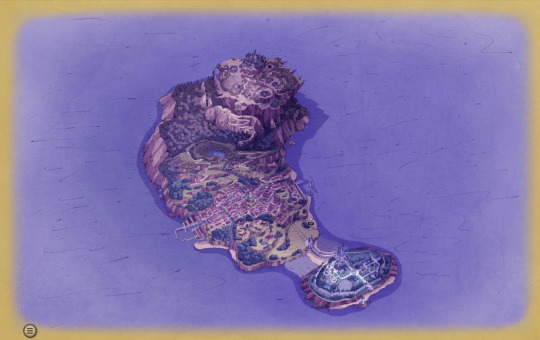#the shape of the isle of sages reminds me of a chicken leg...
Text
Isle of Sages
Thinking about the island that NRC and RSA are both on, the Isle of Sages is very interesting name, and I realized how perfect it is. Of course, the island could be just named after the plant, thus rendering my argument and research useless, BUT ITS FINE...
The philosophical definition of a sage is someone who attained wisdom. This varies from the philosopher, who seeks understanding of the world and makes theories (just like me fr). By the way, there was also a title given to wise men in Ancient Greece, totaling up to The Seven Sages/Seven Wise Men. But when delving deeper into what makes a sage, it defines the differences between NRC and RSA, and I think two characters in particular highlight it:

Dire Crowley and Ambrose the 63rd.
To some groups in Ancient Greece, sages were revered as wise people, living the ideal life, and the word is sometimes evens synonymous with 'good person.' It's to the point that sages were regarded as god-like, and their actions were what a god would do. Sages were the only individuals who know true happiness and could never be harmed by life's troubles, illness, or even death. Nothing would contaminate their soul, for they knew true peace. Marcus Aurelius, a Roman emperor, even said sages were "who [had] knowledge of the beginning and the end, and all pervading reason which orders the universe in its determinate cycles till the end of time." Hm. Depending on the theories you have about the outcome of TWST, this quote hits a little close to home.
On the other hand, Plato, a famous Ancient Greek philosopher, DESPISED sages- or to be exact, sophists. Sophos is the greek word for wise man/wisdom, which could loosely be considered the equivalent of a sage. Coincidentally, sophists were TEACHERS who were said to have specialized in their craft, often in politics or ethics. However, their classes demanded steep prices, and Plato vilified them. In his work, The Sophist, he describes them as merchants of false knowledge, hunters of the young and wealthy, and athletes in the sport of words. They were delusional over their own god-like status. Basically, Plato believed that a sophists priorities were filling their classes with wealthy students to make money, as they searched for power over true knowledge. A sophists teachings revolved around persuasion and public opinion over law and justice. Basically, they made their living through deception (according to Plato).
...See where I'm getting at here?

With sages sounding like absolute saints or the rottenest swindlers, it sounds exactly of what's going on with NRC vs RSA, and no one sums it up better than the Headmages of their respective schools. Crowley is...well, Crowley, who is revealed to uphold nepotism in Book 4 with Kalim being Housewarden, is overall very, very greedy. Thinking about it, there's a money-related motivation in nearly chapter? The prologue with him and the chandelier, Book 2 with the Spelldrive games, Book 3 with the contract he made with Azul to share some profit from the Mostro Lounge, Book 4 and Kalim, Book 5 with the festival and ratings, Book 6 has Idia's family pay him off, not to mention any side events haha. Nearly all of these cases involves students. Plato is rolling in his grave
But Ambrose the 63rd gives off a more traditional wise and caring mentor vibe, who knew there was something wrong at the end of the Book 5 (personally i want to punt that old man out a window BUT the vibe of his character is important to note) because of the leftover magic in the stadium. He's not above showing off, so there's still that hint of eccentricity from the character he's twisted from: Merlin from 1963's Sword in the Stone. Speaking of Merlin, apparently he was considered the most powerful wizard in the world with THE ABILITY TO SEE THE FUTURE. By TWST standards and the fact that fae exist, Ambrose may not be in the top 5 mages, but he has to be incredibly powerful! The Marcus Aurelius quote feels so oddly relevant that I can't convince myself that it's a coincidence anymore. What do these old men know??

There is a layer of significance in the island's name, because in the Phantom Bride event, Rook even says that Crowley is his sage. Honestly, I think Rook is a little sus and I want to theorize about him too, but there is an actual connection between Crowley and a sage.
In the end, as like most of my theories, I don't actually know what any of this means haha. I'd like to think that it's a testament to both Crowley and Ambrose's power, and how their rule has 'shaped' the students that they govern. In Book 1, Riddle states that Crowley's habit of tolerating troublemakers is going to throw everything into chaos one day- and I don't think he's far from the truth. It really goes to show how Crowley might just be the one pulling the strings behind the scenes, and how his own corruption is seeping into his surroundings (may or may not be literal 👀)
#the shape of the isle of sages reminds me of a chicken leg...#twst theory#twst#twst dire crowley#twst ambrose the 63rd#dire crowley#kallistopost
41 notes
·
View notes